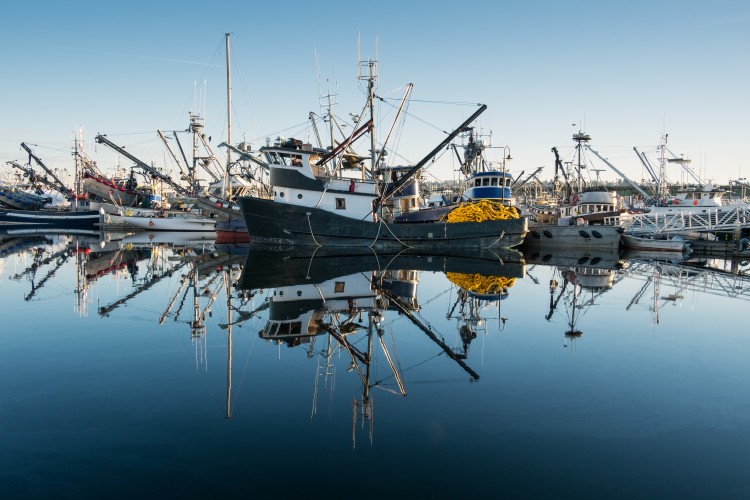
Associate Professor Werner Antweiler joins with global researchers asking the WTO to ban harmful fisheries subsidies

Two hundred and ninety scientific researchers from 46 countries are asking members of the World Trade Organization (WTO) to take the bold step and pass a motion to ban harmful fisheries subsidies at their 12th Ministerial Conference in Geneva. While the conference has been postponed due to concerns around the new COVID-19 Omicron variant, the conference will be convened as soon as conditions allow.
In an open letter, published in Science, and spearheaded by UBC’s Dr. Rashid Sumaila, the scientists, citing a comprehensive body of research, stated that government payments that lower the cost of fuel and vessel construction; provide price support to keep market prices artificially high, and back fleets that plunder the high seas, only incentivize overcapacity and lead to overfishing. This, the scientists said, actively contravenes the aims of the United Nations’ Sustainable Development Goal 14, which is to “conserve and sustainably use the oceans, seas and marine resources for sustainable development.”
UBC Sauder Associate Professor Werner Antweiler is one of the signatories. In this Q&A, he discusses his motivations for joining this effort.
-
Q: How did you get involved with this initiative, and what made you eager to sign the letter?
As the Chair in International Trade Policy at UBC’s Sauder School of Business, I have been keeping a keen eye on any subsidies that have been distorting international trade flows and that have been creating adverse outcomes. Fisheries subsidies are among the most harmful because they encourage overcapacity in fishing fleets. According to the Food and Agriculture Organization of the United Nations (FAO), as of 2017, the percentage of fish stocks that remain within biologically sustainable levels has decreased to 66 per cent, which means that 34 per cent of stocks are overfished at unsustainable levels.
The WTO is in a powerful position to limit harmful subsidies because fish and fish products are some of the most traded foods items in the world, with an export value of about USD 164 billion in 2018. The WTO has been working on new rules since 2001, but with limited progress to date. The Ministerial Conference MC12 that meets in November needs to come to an agreement urgently to eliminate subsidies for illegal, unreported and unregulated fishing and prohibit subsidies that contribute to overcapacity and overfishing, in particular fuel subsidies. It is high time that policy makers listen to the scientists to protect world fish stocks from overfishing and its consequences: food insecurity and economic hardship for coastal communities that depend on fisheries.
-
Q: The letter focused on harmful fisheries subsidies, particularly those that “incentivise overcapacity and lead to overfishing”. What are “harmful subsidies”? Could they be turned to helpful subsidies or should subsidies be gotten rid of entirely?
Subsidies are harmful if they encourage overcapacity of fishing fleets. The most harmful subsidies are those that lower the fixed cost and variable cost of fishing fleets—those directed at distant-water fleets and those directed at lowering the cost of marine fuels. The WTO has the means through extending its existing agreement to ban these harmful fisheries subsidies completely, but it requires consensus among the member countries and some countries have been blocking progress.
Legitimate subsidies are quite limited in scope. Some can be used to help smaller-scale fishing vessels acquire low-impact fishing gear. Also important are subsidies directed into research and innovation that can help develop sustainable fishing practices and aquaculture production techniques, and those that help coastal communities enforce fishing policies.
There is some concern among developing countries that small-scale artisanal fisheries would be harmed by removing subsidies. Yet, the proposed WTO Fisheries Subsidies Elimination Agreement would not impact these because the Special and Differential Treatment clause in the agreement would exempt them and instead focus on the large industrial fleets that are the most harmful.
-
Q: Issues such as overfishing, food sovereignty, and the impact of distant water fleets are very large issues; how can researchers effect change on such a global level?
Researchers contribute hugely to our understanding of overfishing problems. Marine scientists help us understand the impact of overfishing on fish stocks. Economists help us understand how subsidies and other government policies distort incentives that lead to overfishing. Together, researchers from across different research domains and from all continents speak with one voice when it comes to demanding change from our political leaders: we have a collective duty to maintain the world’s fish stocks for the benefit of all future generations as well as our current generation. By raising our voice now, we are telling world leaders that they must not fail in the mission to protect our fish.